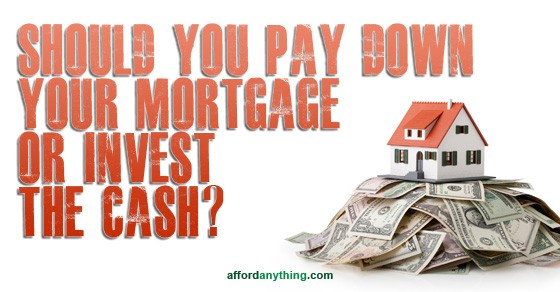Should You Pay Down Your Mortgage or Invest the Cash
Post on: 13 Июль, 2015 No Comment

This question always brings out the punches, kicks and jabs. People have STRONG emotions about debt, even low-interest mortgage debt.
Through Afford Anything lens of Stop Shouting, Start Thinking, lets walk through the potential consequences. You decide.
Everything Has Risk. Period.
Most people want to pay off their mortgage for three reasons:
#1: Emotion: Peace-of-mind
#2: Risk-Management: Reduce the chance of a foreclosure
#3: Savings: Lower their interest payments
These are all great reasons. But nothing is the best choice in a vacuum. It has to be compared to an alternative.
Alternative #1: Spend the money on champagne and strippers. Obviously a terrible choice.
Alternative #2. Invest the money. Okay, this could be a valid option. Lets explore it.
Stocks, historically, have yielded an 8 percent long-term annualized return over the past few decades. Legendary investor Warren Buffet predicts that number will be closer to 7 percent in the coming years. For the sake of argument, lets assume Buffet is right.
Now lets rephase the question. Are you willing to pay extra to get rid of your mortgage faster?
Thats not a rhetorical question. Missed opportunity has its price. If youre willing to pay the opportunity cost for the sake of reducing your risk Great! Go for it! You might be leaving money on the table. If youre okay with that, then you have your answer.
Notice I asked if youre willing to pay the opportunity cost. That doesnt mean you will. No one knows what the future holds. If the markets perform as they historically have done, youll miss opportunity. But if stocks tank, youll come out ahead.
Theres risk in every decision, even the decision to become debt-free.
Should you save or pay off debt? Or invest? Each option has pros and cons.
Paying off your mortgage has:
- Guaranteed interest savings
- Limited upside
- Unknown missed opportunities
Investing is:
- Risky
- Greater potential for upside
- Stronger chance to capitalize on opportunity

Opportunity Cost
You have $100,000 in cash. (Congrats!) You also have a brand-new 15-year mortgage with a balance of $100,000, at 4 percent. (For simplicity sake, Im leaving taxes out of the equation.)
Scenario A: You pay off your mortgage. You save $33,143 in interest payments. You invest $739 per month, the amount that wouldve been your mortgage payment. You contribute every month for 15 years and it grows at 7 percent. At the end of the term, your portfolio is worth $237,706. Hooray!
Scenario B: You invest the entire lump sum in the market. You make no additional contributions. In 15 years, your portfolio is worth $284,894. Youve also paid $33,143 in mortgage interest, which you subtract out. Your net gain is $251,751. Wahoo!
Under this scenario, youve lost the opportunity to make $14,045 by paying down your mortgage early. Boo! Thats a strong argument for investing.
On the other hand, youve enjoyed peace-of-mind, which DOES have a value. You have less risk, higher liquidity and more flexibility.
Is that peace-of-mind worth $14,045? You decide.
Scenario C: You invest the money. The market tanks. You lose your job. Your house gets foreclosed on. Your spouse leaves you, your dog bites you, and even your goldfish wont look at you anymore.
Its a worst-case scenario, but its possible. Now the $14,045 looks like cheap insurance.
(What about borrowing to invest in real estate? Heres my take .)
Quit Being Ideological
You know whats funny about being a personal finance blogger AND a real estate investor? I hear ideologues on both sides of the aisle.
Finance bloggers, as a group, tend to have knee-jerk reactions to the word debt. Debt bad! Debt bad!
Real estate enthusiasts tend to have the opposite reaction. Gimme leverage! More and more and more leverage!
Half the emails I receive about this topic come from people who say, Are you going to pay off your houses as fast as possible? The other half ask, Why arent you borrowing more?!
Dont make decisions based on ideology. Everything financial, even debt payoff, comes at a price. Everything carries risk. Risk wears different costumes, appears in different forms. But its there.
Avoid knee-jerk reactions and zombie ideology. Weigh the risks. Make a spreadsheet . Calculate missed opportunities. Imagine the worst-case scenario and ask yourself if its something you can live with.
Make choices based on information, not ideology.
Then decide for yourself.














